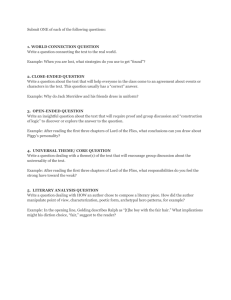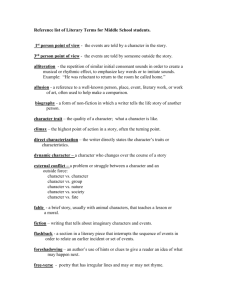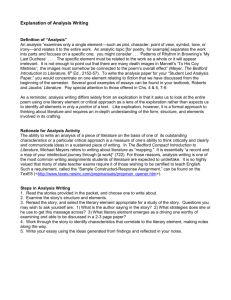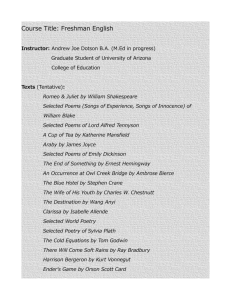Summer Assignment AP Literature and Composition 2014
advertisement
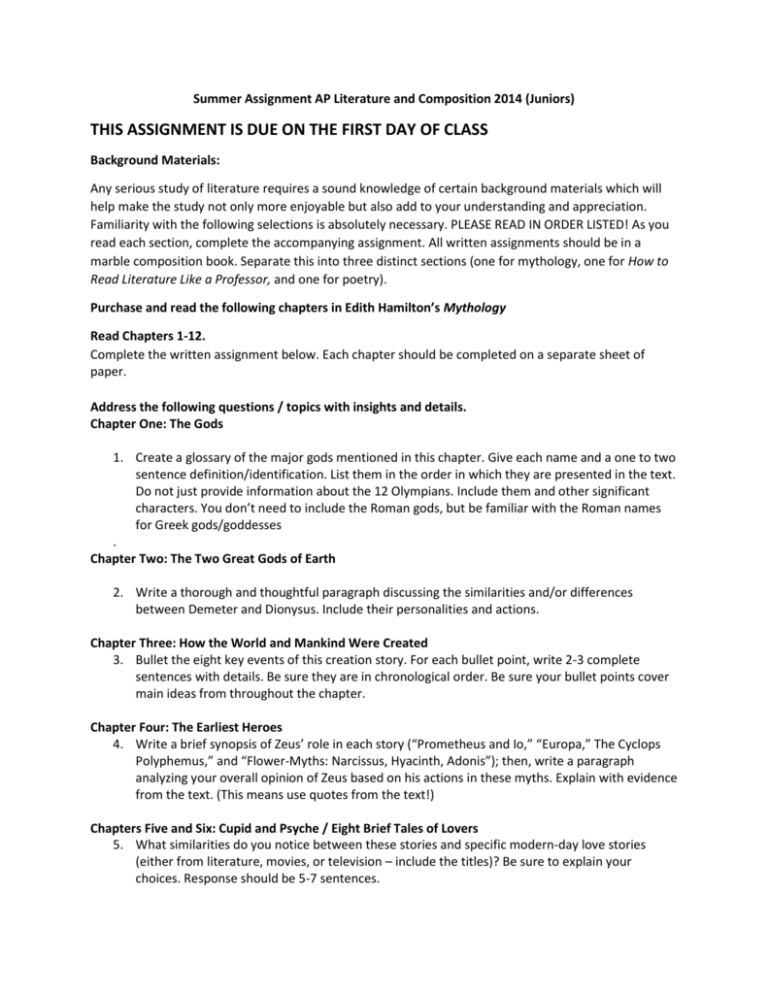
Summer Assignment AP Literature and Composition 2014 (Juniors) THIS ASSIGNMENT IS DUE ON THE FIRST DAY OF CLASS Background Materials: Any serious study of literature requires a sound knowledge of certain background materials which will help make the study not only more enjoyable but also add to your understanding and appreciation. Familiarity with the following selections is absolutely necessary. PLEASE READ IN ORDER LISTED! As you read each section, complete the accompanying assignment. All written assignments should be in a marble composition book. Separate this into three distinct sections (one for mythology, one for How to Read Literature Like a Professor, and one for poetry). Purchase and read the following chapters in Edith Hamilton’s Mythology Read Chapters 1-12. Complete the written assignment below. Each chapter should be completed on a separate sheet of paper. Address the following questions / topics with insights and details. Chapter One: The Gods 1. Create a glossary of the major gods mentioned in this chapter. Give each name and a one to two sentence definition/identification. List them in the order in which they are presented in the text. Do not just provide information about the 12 Olympians. Include them and other significant characters. You don’t need to include the Roman gods, but be familiar with the Roman names for Greek gods/goddesses . Chapter Two: The Two Great Gods of Earth 2. Write a thorough and thoughtful paragraph discussing the similarities and/or differences between Demeter and Dionysus. Include their personalities and actions. Chapter Three: How the World and Mankind Were Created 3. Bullet the eight key events of this creation story. For each bullet point, write 2-3 complete sentences with details. Be sure they are in chronological order. Be sure your bullet points cover main ideas from throughout the chapter. Chapter Four: The Earliest Heroes 4. Write a brief synopsis of Zeus’ role in each story (“Prometheus and Io,” “Europa,” The Cyclops Polyphemus,” and “Flower-Myths: Narcissus, Hyacinth, Adonis”); then, write a paragraph analyzing your overall opinion of Zeus based on his actions in these myths. Explain with evidence from the text. (This means use quotes from the text!) Chapters Five and Six: Cupid and Psyche / Eight Brief Tales of Lovers 5. What similarities do you notice between these stories and specific modern-day love stories (either from literature, movies, or television – include the titles)? Be sure to explain your choices. Response should be 5-7 sentences. Chapter Seven: The Quest of the Golden Fleece 6. What admirable qualities and flawed traits does Jason demonstrate in this story? Include specific examples from the text. Response should be 5-7 sentences. Chapter Eight: Four Great Adventures 7. What morals or lessons are presented in the stories of Phaëthon and Daedalus? Be sure to explain your choices with specific examples from the text. Chapters Nine – Twelve: Perseus, Theseus, Hercules, Atalanta (and the boar hunt) 8. Which of these heroes is the most heroic and why? Which one is the least heroic and why? Be sure to include specific examples from the stories. Purchase and read How to Read Literature like a Professor by Thomas C. Foster and answer the accompanying questions. Your answers should fully respond to the questions. However, full essay responses are not necessary. Think paragraphs, not pages. Chapter Assignments As you read each chapter, please complete the following assignments. Remember you should not write essays for these assignments, one to two paragraphs for each will be sufficient. Use works of literary merit as examples. Keep all of these in order and write them at the end of your smash journal (marble composition book) on the novel. Introduction: How'd He Do That? How do memory, symbol, and pattern affect the reading of literature? How does the recognition of patterns make it easier to read complicated literature? Discuss a time when your appreciation of a literary work was enhanced by understanding symbol or pattern. Chapter 1 -- Every Trip Is a Quest (Except When It's Not) List the five aspects of the QUEST and then apply them to something you have read (or viewed) in the form used on pages 3-5. Chapter 2 -- Nice to Eat with You: Acts of Communion Choose a meal from a literary work and apply the ideas of Chapter 2 to this literary depiction. Chapter 3: --Nice to Eat You: Acts of Vampires What are the essentials of the Vampire story? Apply this to a literary work you have read or viewed. Remember that a character does not have to be a literal blood-sucking vampre in order to embody these characteristics. Chapter 4 -- If It's Square, It's a Sonnet Select three sonnets and show which form they are. Discuss how their content reflects the form. (Submit copies of the sonnets, marked to show your analysis). Chapter 5 --Now, Where Have I Seen Her Before? Define intertextuality. Discuss three examples that have helped you in reading specific works. Chapter 6 -- When in Doubt, It's from Shakespeare... Discuss a work that you are familiar with that alludes to or reflects Shakespeare. Show how the author uses this connection thematically. Read pages 44-46 carefully. In these pages, Foster shows how Fugard reflects Shakespeare through both plot and theme. In your discussion, focus on theme. Chapter 7 -- ...Or the Bible Read "Araby" James Joyce (available online). Discuss Biblical allusions that Foster does not mention. Look at the example of the "two great jars." Be creative and imaginative in these connections. Chapter 8 -- Hanseldee and Greteldum Think of a work of literature that reflects a fairy tale. Discuss the parallels. Does it create irony or deepen appreciation? Chapter 9 -- It's Greek to Me Write a free verse poem derived or inspired by characters or situations from Greek mythology. Chapter 10 -- It's More Than Just Rain or Snow Discuss the importance of weather in a specific literary work, not in terms of plot. Interlude -- Does He Mean That Chapter 11 --...More Than It's Gonna Hurt You: Concerning Violence Present examples of the two kinds of violence found in literature. Show how the effects are different. Chapter 12 -- Is That a Symbol? Use the process described on page 106; investigate the symbolism of the fence in "Araby." (Mangan's sister stands behind it.) Chapter 13 -- It's All Political Assume that Foster is right: it is all political. Use his criteria to show that one of the major works you have read is political. Chapter 14 -- Yes, She's a Christ Figure, Too Apply the criteria on page 119 to a major character in a significant literary work. Try to choose a character that will have many matches. This is a particularly apt tool for analyzing film -- for example, Star Wars, Cool Hand Luke, Excalibur, Malcolm X, Braveheart, Spartacus, Gladiator and Ben-Hur. Chapter 15 -- Flights of Fancy Select a literary work in which flight signifies escape or freedom. Explain in detail. Chapter 16 -- It's All About Sex... Chapter 17 -- ...Except the Sex OK ..the sex chapters. The key idea from this chapter is that "scenes in which sex is coded rather than explicit can work at multiple levels and sometimes be more intense that literal depictions" (141). In other words, sex is often suggested with much more art and effort than it is described, and, if the author is doing his job, it reflects and creates theme or character. Choose a novel or movie in which sex is suggested, but not described, and discuss how the relationship is suggested and how this implication affects the theme or develops characterization. Chapter 18 -- If She Comes Up, It's Baptism Think of a "baptism scene" from a significant literary work. How was the character different after the experience? Discuss. Chapter 19 -- Geography Matters… Discuss at least four different aspects of a specific literary work that Foster would classify under "geography." Chapter 20 -- ...So Does Season Find a poem that mentions a specific season. Then discuss how the poet uses the season in a meaningful, traditional, or unusual way. (Submit a copy of the poem with your analysis.) Interlude -- One Story Write your own definition for archetype. Then identify an archetypal story and apply it to a literary work with which you are familiar. Chapter 21 -- Marked for Greatness Figure out Harry Potter's scar. If you aren't familiar with Harry Potter, select another character with a physical imperfection and analyze its implications for characterization. Chapter 22 -- He's Blind for a Reason, You Know Chapter 23 -- It's Never Just Heart Disease... Chapter 24 -- ...And Rarely Just Illness Recall two characters who died of a disease in a literary work. Consider how these deaths reflect the "principles governing the use of disease in literature" (215-217). Discuss the effectiveness of the death as related to plot, theme, or symbolism. Chapter 25 -- Don't Read with Your Eyes After reading Chapter 25, choose a scene or episode from a novel, play or epic written before the twentieth century. Contrast how it could be viewed by a reader from the twenty-first century with how it might be viewed by a contemporary reader. Focus on specific assumptions that the author makes, assumptions that would not make it in this century. Chapter 26 -- Is He Serious? And Other Ironies Select an ironic literary work and explain the multi-vocal nature of the irony in the work. Poetry Component: Listed below are some important literary movements/schools of literature. Research each one to become familiar with its basic characteristics (you may wish to read author biographies as well). All of the poems can be found on the internet. 1. Briefly summarize/define the characteristics of each movement. 2. Next, read the listed poems and for each one: Explain how each poem listed reflects the features of the literary movements to which it belongs. Answer the “reading poetry” questions that follow for each poem: o What is the situation of the poem? (Who is speaking, to whom, where, and why?) o How are the ideas arranged in the poem? (Cause/effect, general to specific, main idea with examples, etc.) o What is the author’s attitude toward the subject matter? Does the author’s attitude differ from the speaker’s attitude? How…and how can you detect the difference? o What seems to be the central message/concerns/issues (theme) of the poem? o Note and discuss particularly effective uses of the following: Diction Images Simile, metaphor, allusion, irony or symbol Metaphysical Poetry • John Donne— “Holy Sonnet XIV”(“Batter my Heart”); “A Valediction Forbidding Mourning”; “The Flea” • Andrew Marvell—“To His Coy Mistress” Romantic Poetry • William Wordsworth—“I Wandered Lonely as a Cloud”; “We Are Seven” • Percy Shelley—“Ode to the West Wind” • John Keats—“Ode on a Grecian Urn” Transcendental Poetry • Ralph Waldo Emerson—“The World Soul” • Walt Whitman—“When I Heard the Learn’d Astronomer”; “A Noiseless Patient Spider” Symbolist Poetry • W.B. Yeats—“The Second Coming” • T.S. Eliot—“The Love Song of J. Alfred Prufrock” Modernism • Wallace Stevens—“Anecdote of the Jar” • William Carlos Williams—“Spring and All” • e.e. cummings—“next to god of course America I” • H.D. (Hilda Doolittle)—“Helen” Harlem Renaissance • Paul Lawrence Dunbar—“We Wear the Mask” • Langston Hughes—“I Too Sing America”: “Dream Deferred” Confessional Poetry • Robert Lowell—“For the Union Dead” • Sylvia Plath—“Daddy” Black Arts Movement • Gwendolyn Brooks—“The Bean Eaters”; “We Real Cool” We will begin the year with poetry, then move directly into Shakespeare. You should have a copy of the Hamlet by the 3rd week of school.


